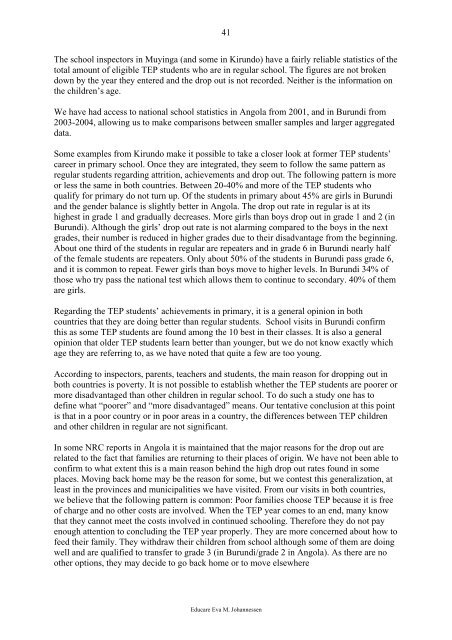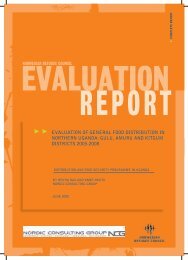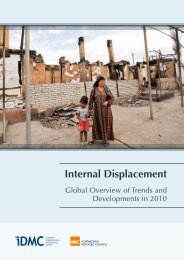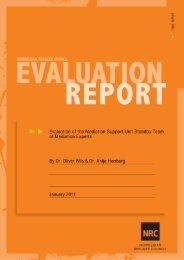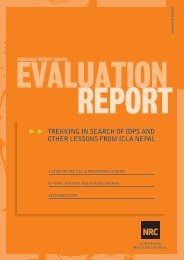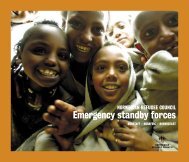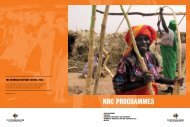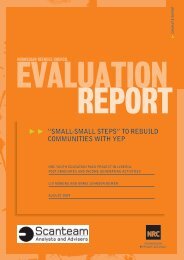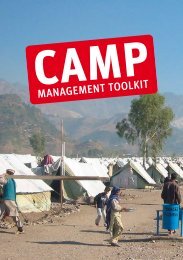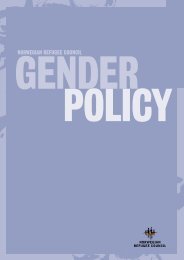ONE STEP CLOSER - BUT HOW FAR? - Norwegian Refugee Council
ONE STEP CLOSER - BUT HOW FAR? - Norwegian Refugee Council
ONE STEP CLOSER - BUT HOW FAR? - Norwegian Refugee Council
- No tags were found...
You also want an ePaper? Increase the reach of your titles
YUMPU automatically turns print PDFs into web optimized ePapers that Google loves.
41The school inspectors in Muyinga (and some in Kirundo) have a fairly reliable statistics of thetotal amount of eligible TEP students who are in regular school. The figures are not brokendown by the year they entered and the drop out is not recorded. Neither is the information onthe children’s age.We have had access to national school statistics in Angola from 2001, and in Burundi from2003-2004, allowing us to make comparisons between smaller samples and larger aggregateddata.Some examples from Kirundo make it possible to take a closer look at former TEP students’career in primary school. Once they are integrated, they seem to follow the same pattern asregular students regarding attrition, achievements and drop out. The following pattern is moreor less the same in both countries. Between 20-40% and more of the TEP students whoqualify for primary do not turn up. Of the students in primary about 45% are girls in Burundiand the gender balance is slightly better in Angola. The drop out rate in regular is at itshighest in grade 1 and gradually decreases. More girls than boys drop out in grade 1 and 2 (inBurundi). Although the girls’ drop out rate is not alarming compared to the boys in the nextgrades, their number is reduced in higher grades due to their disadvantage from the beginning.About one third of the students in regular are repeaters and in grade 6 in Burundi nearly halfof the female students are repeaters. Only about 50% of the students in Burundi pass grade 6,and it is common to repeat. Fewer girls than boys move to higher levels. In Burundi 34% ofthose who try pass the national test which allows them to continue to secondary. 40% of themare girls.Regarding the TEP students’ achievements in primary, it is a general opinion in bothcountries that they are doing better than regular students. School visits in Burundi confirmthis as some TEP students are found among the 10 best in their classes. It is also a generalopinion that older TEP students learn better than younger, but we do not know exactly whichage they are referring to, as we have noted that quite a few are too young.According to inspectors, parents, teachers and students, the main reason for dropping out inboth countries is poverty. It is not possible to establish whether the TEP students are poorer ormore disadvantaged than other children in regular school. To do such a study one has todefine what “poorer” and “more disadvantaged” means. Our tentative conclusion at this pointis that in a poor country or in poor areas in a country, the differences between TEP childrenand other children in regular are not significant.In some NRC reports in Angola it is maintained that the major reasons for the drop out arerelated to the fact that families are returning to their places of origin. We have not been able toconfirm to what extent this is a main reason behind the high drop out rates found in someplaces. Moving back home may be the reason for some, but we contest this generalization, atleast in the provinces and municipalities we have visited. From our visits in both countries,we believe that the following pattern is common: Poor families choose TEP because it is freeof charge and no other costs are involved. When the TEP year comes to an end, many knowthat they cannot meet the costs involved in continued schooling. Therefore they do not payenough attention to concluding the TEP year properly. They are more concerned about how tofeed their family. They withdraw their children from school although some of them are doingwell and are qualified to transfer to grade 3 (in Burundi/grade 2 in Angola). As there are noother options, they may decide to go back home or to move elsewhereEducare Eva M. Johannessen


